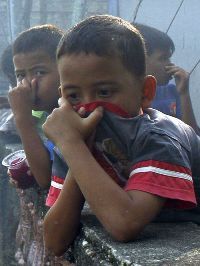The alarming level of air pollution in Indian cities, highlighted in reports from academia across the world and global agencies, has at last woken up people who matter in India.
 What has struck home is that Beijing, till now widely reported as among the most polluted cities in the world, has been overtaken by Delhi, which has risen to the top of the poor air quality league.
What has struck home is that Beijing, till now widely reported as among the most polluted cities in the world, has been overtaken by Delhi, which has risen to the top of the poor air quality league.
The most alarming is a recent report in The Economic Times by Urmi Goswami citing research by environmental economists from Chicago, Harvard and Yale that finds that well over half of the Indian population may be set to lose three years of their lives due to the adverse effects of breathing air with highly excessive levels of pollutants.
It has been known for some time that the air that people breathe in Indian cities is among the worst in the world.
Over half of the most polluted cities in the world are in India, said a World Health Organization report released in the middle of last year. Later in the year, the Union environment ministry announced the launch of an air quality index, so that citizens can make sense of complex air quality data covering several measures.
But India still remains severely lacking in monitoring and instant transmission of air quality data that people can access and decide, for example, whether to send children to school, or even for adults to go out on a particular day. Those who can afford it are taking precautions. Embassies are buying air purifiers for their staff to install in their homes.
At least one has advised diplomats to consider if they should bring their children to India or not. Private companies have begun to install air purifiers in their offices.
It is boom time, say people who are in the air-purification business. Some action, with the right approach, may be on the way.
Budget 2015: Complete Coverage
The new chief minister of Delhi, Arvind Kejriwal, is reported to have asked his environment and forest department officials at their first review meeting to set aside all their prepared presentations and come up with “offbeat” ideas on how to quickly get to work on the city’s air pollution.
Things have come to such a pass because there has been a conscious attempt by politicians across the spectrum and businessmen to reduce pollution issues to being merely the pet concern of “environmentalists”, whereas it is they who articulate the concerns of the majority that is to raise incomes and remove poverty.
The Left in West Bengal chalked up a miserable environmental record during its three-decade rule because 'class struggle' came before 'fraternity' -- the need to unitedly look after the environment, a public good that affects all.
The current rulers, the National Democratic Alliance, following the same tradition, have promised to see through the clearances for mining and power projects that were held up because of the perceived damage they would cause to the scant forest cover of the country and its environment.
And businessmen have cheered them along the way.
“Air pollution is an urgent public health problem that deserves policy attention,” Michael Greenstone of the University of Chicago, who led the study, is quoted in the news report referred to earlier.
“In approaching the issue of air pollution as one of public health, it would be possible to break the perception and understanding that addressing environmental issues like air pollution and economic growth/development are somewhat opposed to each other.”
There is no trade-off between environment protection and development.
The only development that works is 'sustainable development'.
This has to be appreciated by politicians, businessmen and economists.
Here is a short list of offbeat solutions that can be quickly adopted.
First, sharply ramp up clearing solid waste in urban areas, so that municipal sweepers and also the public do not have to burn garbage that is not collected.
A big change can be brought about in this area in weeks.
Second, sharply increase the number of buses that run on compressed natural gas, so that clean and comfortable buses are regularly available to people who would like to stop taking out their cars for routine journeys like office commutes.
The timing, route and frequency of bus services can be monitored by fitting them with GPS sensors and a stick-and-carrot approach adopted to ensure compliance while allowing the buses to be privately run and operated.
This system has already been adopted in Indore.
Third, once a vastly improved bus service is in place in a year or two, economic disincentives can be put in place to discourage the use of private cars by raising the tax on them and introducing a congestion surcharge in inner city areas.
This has been done in many cities in the world.
Fourth, in central and eastern India, coal continues to be used to light household fires, severely affecting air quality, particularly in winter.
This can be discouraged by ensuring the supply of low-emission briquettes in three to four years, and subsidising their price.
Photograph: Reuters











